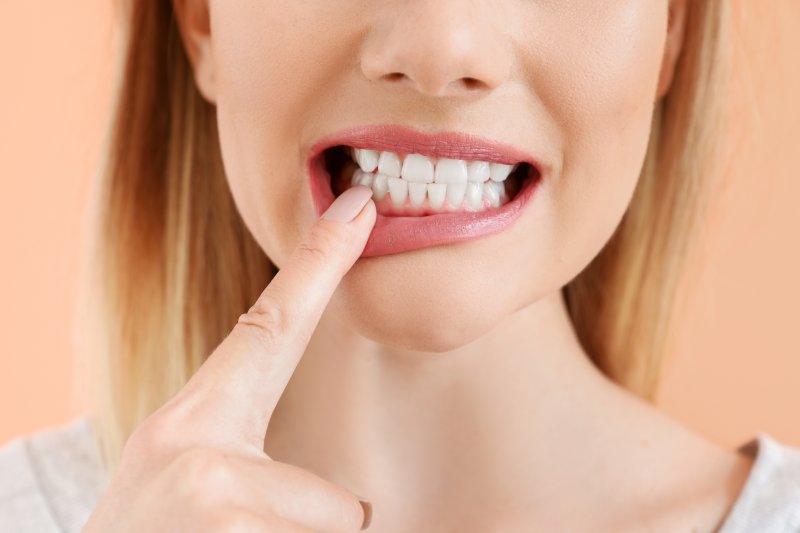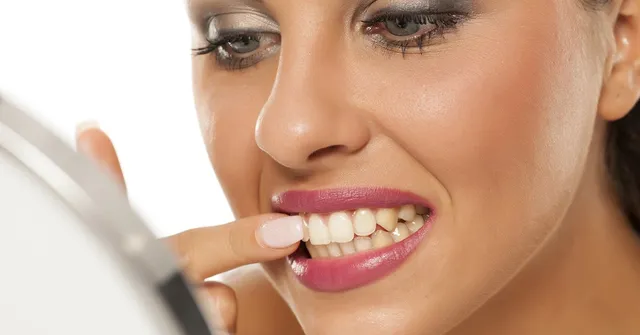Signs your teeth are shifting due to a variety of factors, such as aging, heredity, tooth loss, oral habits, or inadequate orthodontic treatment.
Tooth shifting may have a major influence on dental health and appearance. It is a phenomenon that is sometimes overlooked until it becomes more noticeable.
Today, we’ll identify the warning symptoms of shifting teeth, investigate frequent reasons, and stress the significance of treating it as soon as possible.

Understanding the signs your teeth are shifting
dental shifting can show up as crowding, uneven bite patterns, gaps between teeth, loose teeth, or even changes in dental alignment.
These changes can happen to both adults and children, and they can have a number of reasons.
Recognizing and treating the problem before it worsens can be made easier by being aware of the symptoms and causes of shifting teeth.
After wearing braces, do teeth move back?
Your teeth are more likely to move and reverse the effects of your orthodontic treatment if you don’t use your retainer appropriately after getting braces. There’s always the potential that your teeth will slip out of place when your braces are taken off, since your braces function by gently pressing on your teeth to gradually realign them. But the quantity of movement varies from person to person and is unpredictable.
This is why it’s crucial that you wear your retainer as prescribed by your orthodontist. After treatment, wearing your retainer on a regular basis can help keep your perfectly aligned teeth in place. To further safeguard your straightened teeth, we advise using a mouthguard if you participate in any contact sports.
Typical reasons for teeth shifting
Tooth shifting is caused by a number of reasons, including:
- Aging: As we get older, our bones and tissues alter, causing our teeth to move.
- Loss of teeth: Teeth that are next to a gap may move toward the area left by the gap.
- Dental conditions: Tooth shifting can result from weakening of the support structures caused by periodontal disease, tooth decay, or other dental issues.
- Lifestyle and habits: Teeth can shift as a result of pressure from oral behaviors such as tongue thrusting, bruxism, or using teeth as tools.
What happens if your jaw is out of alignment but your teeth are straight?

Your jaw may not be properly aligned, regardless of how straight your teeth are, if you’re feeling pain or discomfort in it. A sudden misalignment of your jaw can have an impact on your day-to-day activities, including eating, speaking, and sleeping.
While injuries or stress might be the source of some jaw pain, dental misalignment can also be the cause. Here are a few indicators of a misplaced jaw to watch out for:
- jaw-clicking
- jaw tenseness
- discomfort in your shoulder, back, temples, or jaw
- tinnitus or popping in your ears
- trouble chewing food or speaking
- sighing in anticipation.
See your orthodontist for information on potential treatments if you have any of these symptoms.
Signs and indicators of teeth shifting
- Teeth movement: Noticable tooth movement or displacement from their original placements is one of the main indicators of tooth shifting.
- Bite abnormalities: When your teeth move, it might result in an uneven bite, which can hurt or be difficult to bite or eat.
- Spaces and gaps: When teeth move, they might leave behind spaces and gaps where they used to be closely spaced.
- Crowding: Moving teeth around can result in overcrowding, which makes it difficult to clean them effectively because they are closely spaced and may even overlap.
- Teeth that are loose: Shifting teeth can result in teeth that are loose, which can be concerning and may point to underlying problems.
Consequences of untreated tooth movement
There are several negative effects of ignoring tooth shifting on your oral health.
In order to avoid more issues, it is imperative that the following be addressed:
- Dental misalignment: Your bite’s correct alignment may be thrown off when teeth move.
- An uneven wear pattern on teeth, jaw discomfort, and trouble speaking or eating can result from this misalignment.
- mouth health problems: It may be more difficult to clean teeth that have moved, which raises the risk of dental decay, gum disease, and mouth infections.
- Significant tooth movement can cause your jaw joints to get out of sync, which might result in temporomandibular joint dysfunction (TMJ).
- Jaw discomfort, popping or clicking noises, headaches, and limited jaw mobility can all be symptoms of TMJ.
Does moving teeth cause pain?
Since moving teeth is a slow procedure, discomfort usually does not appear right away. Nonetheless, certain reasons for tooth shifting might be related to other conditions, such periodontal disease. In order to determine the intensity and underlying cause of your discomfort, you should schedule an appointment with your orthodontist. In the meantime, over-the-counter pain relievers should be helpful.
Managing and preventing tooth shifting
While some tooth shifting may happen naturally, there are things you can do to stop or control bigger shifts:
- Frequent dental checkups: Make an appointment on a regular basis to enable your dentist to keep an eye on your oral health, see any early indications of shifting teeth, and offer advice as needed.
- Orthodontic therapy: It could be advised to undergo orthodontic treatment if there is a considerable shift in the teeth.
- Teeth can be realigned, and abnormal bites can be corrected using braces, clear aligners, or orthodontic tools.
- Retainers: Following orthodontic treatment, using the retainers that your dentist or orthodontist recommended can help you keep your teeth in their proper alignment and avoid recurrence.
- Oral hygiene: Maintain proper oral hygiene by using mouthwash, flossing often, and brushing your teeth twice a day.
- Maintaining good dental hygiene lowers the chance of tooth decay and gum disease, both of which can cause tooth shifting.
- Modifications to your lifestyle: Steer clear of practices that put undue strain on your teeth, such as biting your nails, utilizing your teeth as tools, or chewing on ice or pens.
- Like wrinkles or other physical changes, tooth mobility happens naturally as people age. But by keeping your mouth healthy and using your retainer, we can delay unintended changes to your teeth.
- Wearing a mouthguard when playing sports might also shield your teeth against injury that can cause shifting.
When to get expert assistance
In the event that you observe any indications of tooth movement, consult a dentist.
Your dentist is able to assess the condition of your teeth, ascertain the degree of shifting, and suggest the best course of action.
The optimum result can be guaranteed and further issues can be avoided with early action.
Summary
Inconsistent biting patterns, spaces between teeth, crowding, and even loose teeth can result from moving teeth.
It can lead to temporomandibular joint disease (TMJ), oral health issues, and dental misalignment if treatment is not received.
Teeth shifting is a result of a number of factors, including age, tooth loss, dental diseases, and lifestyle choices.
Frequent dental examinations, orthodontic treatment when needed, retainer use, proper oral cleanliness, and lifestyle modifications are all important in preventing and controlling tooth movement.
Early intervention to prevent tooth shifting helps preserve dental health at its best and stop more issues.
Recall to consult your dentist or orthodontist for expert assistance if you observe any indications of tooth movement.
They are able to assess your condition, recommend the best course of action, and help you achieve a straight and healthy smile.
FAQs
- How can I tell whether my teeth are moving?
Keep an eye out for symptoms including crooked teeth, gaps between your teeth, or changes in your bite. Teeth shifting may also be indicated by increased dental sensitivity.
- Is it possible to stop teeth from moving?
Teeth shifting can be prevented or at least lessened to some degree by practicing proper oral hygiene and scheduling timely dental treatment, even if there are some circumstances that may be beyond your control.
- What solutions are there for treating tooth shifting?
Braces, retainers, or dental surgery are possible treatment options, depending on the degree of tooth movement and underlying causes.
- How frequently should I have checkups at the dentist?
Generally speaking, you should schedule a checkup with your dentist every six months. But make an appointment right away if you see any indications of teeth moving or other dental problems.
- Does moving your teeth come with any risks?
If left untreated, shifting teeth can result in gum disease, tooth decay, and functional concerns, including trouble biting food. You may reduce these risks and maintain the condition of your teeth by seeking treatment as soon as possible.

